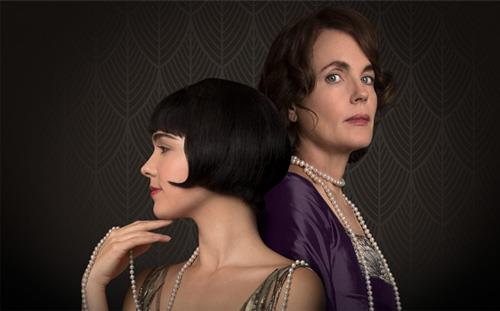
At first blush, The Chaperone might seem like the perfect antidote for PBS viewers suffering from Downton Abbey withdrawal.
The Chaperone, which airs on PBS at 9 p.m. ET Sunday (check local listings), was written by Downton creator Julian Fellowes and stars Downton's Elizabeth McGovern (top) as the title character.
It's also mostly set, like Downton, in the 1920s.
That pretty much exhausts the similarities, however, and it must be said that The Chaperone matches neither the dramatic nor visual sweep of Downton.
It's not bad or unenjoyable. It just lacks the richness of the beloved series, and the script feels curiously choppy, as though Fellowes started with something longer in mind and had to whittle it down to the length of a movie.
McGovern plays Norma Carlisle, who escaped a hardscrabble childhood by marrying a successful man who has given her a comfortable, if somewhat sheltered and provincial life in Wichita.
Her husband Alan (Campbell Scott) has a secret, however, which has unsettled Norma enough that she impulsively decides to leave Alan and their two sons long enough to chaperone an ambitious local girl to New York for a tryout as a ballet dancer.
That ambitious local girl turns out to be Louise Brooks (Haley Lu Richardson, top), who, in real life, became a major star of silent films and early talkies. When viewers and Norma meet Louise, she's 16 going on 40, world-wise beyond her years, albeit not quite as smart as she thinks she is.
The viewer at this point might logically expect The Chaperone to follow Brooks' early steps toward what would soon become international fame, with some fun facts on how this early trip to New York with a woman she didn't know played into her impending stardom.
We get a whiff of that. We get far more on how this trip impacts the life of Norma, who, when it's over, returns to Wichita, her husband, and his secret.
We don't know this is where The Chaperone is going, however, until we have learned the elaborate backstory of how Norma and Louise partnered up and join them on their train ride to the big city.
It's only when we get there, and Louise dances off to her first tryout sessions that we realize Norma has an agenda of considerably more personal significance than trying to keep tabs on an entitled teenage prodigy.
She's taking a roots trip, with her first stop at the indelibly named Home for Friendless Girls.
It's the Catholic orphanage where Norma spent several years before being bundled onto a train and sent West along with a sheaf of other orphans. At each stop, they were put on display, giving the locals a chance to see if they liked one enough to keep it.
It's a system that, to modern ears, sounds perilously close to human trafficking. It was standard practice a century ago, and for Norma, it was, to all appearances, mission accomplished. That's how she met Alan and graduated from orphanage life to prosperity.
What she wants on this trip, however, is information. She wants to know who her birth parents were and whether there are any indications why they gave her up.
Again following the standard practice of the times, the nuns who run the orphanage tell her no way and warn that quests like hers almost always end badly.
Fortunately for Elizabeth, an unlikely long shot presents itself. She finds an employee, Joseph (Géza Röhrig), who may have a way for her to slip into the archives.
All does not go well for Norma and Joseph. They persist, however, and by now, something else is clear. Louise's story has become almost a footnote, henceforth to be fleshed out only in brief vignettes and summations.
McGovern and Richardson give solid performances, even when the script requires them to shift gears abruptly. It is no fault of theirs that compared to Downton, The Chaperone lacks the texture and richness of other Masterpiece productions.
If it's not a masterpiece, though, it's a decent, entertaining exploration of self-discovery, with some nice period touches and a final scene that's a splendid tribute to humanity's capacity for personal growth.